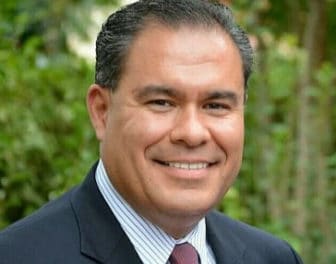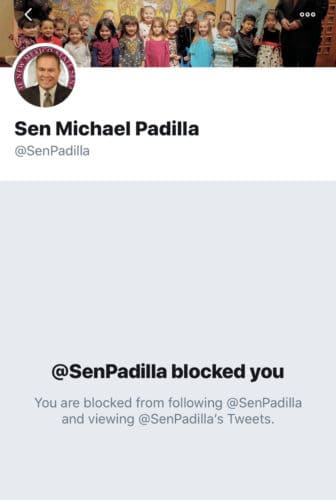COMMENTARY: President Donald Trump violated people’s First Amendment rights when he blocked them on Twitter.
Spaceport America violated my First Amendment rights when it blocked me on Twitter.
Several court rulings have affirmed that government officials can’t exclude people from accessing their social media accounts to avoid criticism. Most prominently, federal appeals judges in New York ruled in July that Trump can’t block Twitter users from an “otherwise open online dialogue” because he doesn’t like what they say.
So it was discouraging to discover this week that state Sen. Michael Padilla had blocked me on Twitter. Like, seriously? What Democrat wants to be compared in a column, because of their own behavior, to Trump? But here we are.

I became aware that the Albuquerque Democrat had blocked me because the Twitter account for the N.M. Senate Democratic caucus, which I follow, retweeted something Padilla had tweeted — and I was forbidden from seeing it.
Viewpoint discrimination is the only logical reason Padilla would have blocked me. When he was running for lieutenant governor in 2017, my girlfriend, Sarah Silva, helped spark a chain of events that led to him dropping out of the race.
Sarah highlighted past sexual harassment allegations against Padilla on Facebook in November 2017. With his candidacy, she said, Democrats risked losing her vote.
A day later, the Associated Press was interviewing Sarah for an article, along with now-Gov. Michelle Lujan Grisham (then the frontrunner in a contested gubernatorial primary). Lujan Grisham told the news organization that Padilla should leave the race.
I wrote a column owning up, as a journalist and a man, to not being tough enough on Padilla for his alleged treatment of women. “The system protected Michael Padilla for too long,” my column’s headline read. “No more.”
Padilla didn’t immediately quit the lieutenant governor’s race, but the furor continued. A couple of weeks later I ran a column written by Democratic consultant Heather Brewer calling for Padilla to drop out. Later that day, he did.
Is that when Padilla blocked me? I don’t know.
When I discovered it this week, I complained loudly on Twitter. Padilla unblocked me quickly and wrote in a tweet, “Hello @haussamen haven’t blocked you. Thanks for letting me know.”
Unconstitutional infringement on my rights ended. Thanks for letting me know.

After that I heard from other social media users who’d been blocked by government accounts — including someone who used to work for former Gov. Susana Martinez being blocked by the N.M. Senate Democrats’ account and a former student at a public university being blocked by that school after he was critical of its administration.
Government folks, you have to stop doing this.
Public officials are allowed to have social media accounts for their private lives. They can block people from accessing those. The First Amendment doesn’t give someone who disagrees with your actions the right to troll your family and say mean things about your children on a personal Facebook page.
But when you discuss or conduct government business on social media — as Trump and Padilla do on Twitter — you can’t exclude people from that public forum because you don’t like their views or they’ve criticized yours. Lack of accessibility is part of the story of how, over generations, people lost trust in their government. It’s part of how we got the current disaster that is the Trump presidency.
We must always fight zealously for government transparency and accessibility. The appellate court ruling in the case against Trump “will help ensure the integrity and vitality of digital spaces that are increasingly important to our democracy,” said Jameel Jaffer, director of the Knight First Amendment Institute at Columbia University, which brought the lawsuit.
“The ruling,” Jaffer said, “will ensure that people aren’t excluded from these forums simply because of their viewpoints and that public officials don’t transform these digital spaces into echo chambers.”
I understand why some government officials and agencies want to block people from seeing or responding to their tweets. I’ve blocked a handful of people on Twitter and Facebook who trolled me ruthlessly and weren’t interested in serious discussion.
But my job isn’t paid for with tax dollars. If you choose to work for the government, the First Amendment gives people the right to petition you and discuss your actions. Always. No matter how harsh their critique, you can’t take away that right.
Public officials who don’t want to face criticism on social media shouldn’t create accounts to discuss public business. It’s really that simple.